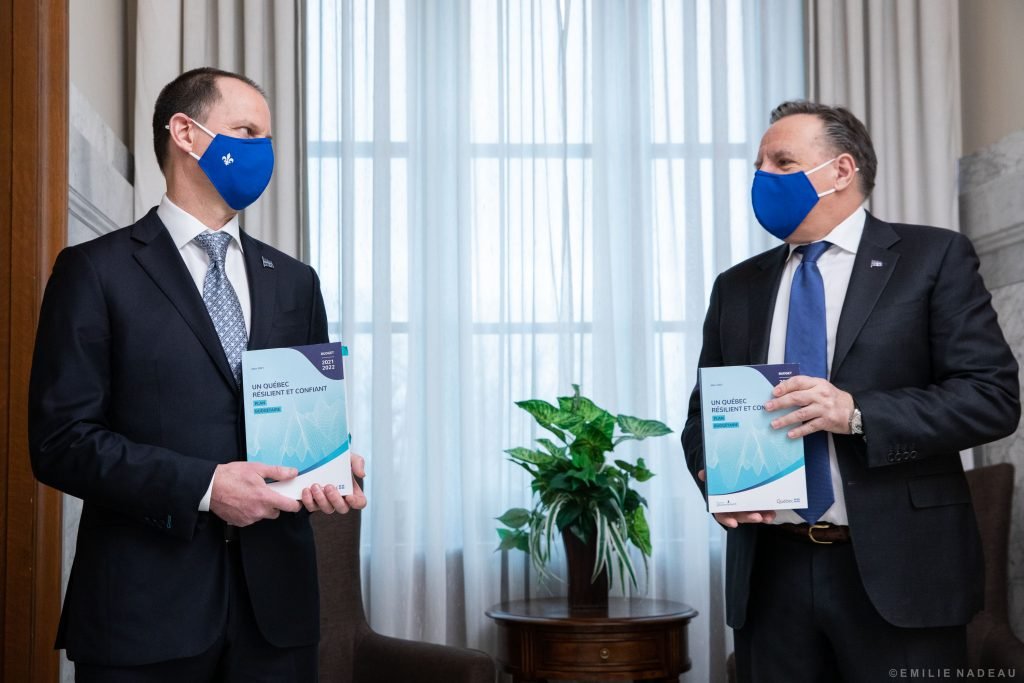Money into health care, will delay balancing budget
‘We first have to beat the pandemic,’ finance minister says in projecting $12.3B deficit
Jonathan Montpetit · CBC News · Posted: Mar 25, 2021 4:06 PM ET | Last Updated: March 25
Premier François Legault, right, and Finance Minister Eric Girard tabled Quebec’s budget on Thursday. They expect to finish 2021-2022 with a $12.3-billion deficit.
With the end of the pandemic still uncertain, Quebec announced Thursday it is pushing back its timeline for balancing the budget and focusing short-term spending on supporting the health-care system and the economy.
On a day when the province recorded its highest increase in infections since mid-February, Finance Minister Eric Girard tabled what he called a “pandemic budget” that projects a deficit of $12.3 billion for the 2021-22 fiscal year.
Girard had initially been insisting that Quebec would eliminate its massive deficit within five years, as required by the Balanced Budget Act. But on Thursday he said he will seek to suspend the law temporarily to give the government seven years to get out of the red.
Eric Girard speaks with CBC Montreal’s Debra Arbec about delaying balancing the budget. 4:36
The delay will also allow the government to put off difficult decisions about budget cuts until after the next election, scheduled for fall 2022.
“Each thing in its own time. We first have to beat the pandemic,” Girard said at a news conference in Quebec City, noting the province will spend an additional $4.2 billion this year on measures related to COVID-19.
That sum is in addition to the nearly $12 billion Quebec has spent so far trying to deal with the pandemic, which has claimed 10,630 lives in the province, the highest death toll in the country.
“The past year has been extremely trying,” Girard said in his speech to the National Assembly. “Behind the figures are people who lost their lives.”
Health care gets bulk of new money
The spending plan released Thursday details $5.2 billion worth of new spending measures for this year, of which $2.9 billion will go into the health-care system.
The government’s spending priorities for health care appear to be influenced by the disastrous scenes this spring in long-term care homes, where thousands of elderly Quebecers contracted COVID-19 and many died in inhumane conditions caused by staffing shortfalls.
There is more than $300 million earmarked for initiatives aimed at improving living conditions for elderly Quebecers, and helping them avoid the need for institutionalized care.
The initiatives include increasing the tax credit for home support services, a vague promise to increase supply of these services and financial support for private seniors’ residences.
“For the government, it is essential for seniors and people with disabilities to preserve their independence and stay in their homes for as long as possible,” Girard said in his speech.
But the bulk of the 5.8 per cent increase in health-care funding will go toward paying the salaries of health-care workers and buying them protective equipment, as well as front-line services for the public.
The latter sum includes $350 million that will be spent this year vaccinating Quebecers against COVID-19.
Generating more jobs
Once the pandemic ends, Girard said the government’s priority will shift toward guiding the economy back to full employment.
There are $1.5 billion worth of initiatives in the budget aimed at recapturing some of the economic growth the province lost over the last year.
Much of that money is aimed at boosting the economic potential of Quebec’s outlying regions.
But the focus on infrastructure projects to charge up the recovery was poorly received by the opposition parties, who pointed out the male-dominated construction industry is already back operating at full-tilt. (Ryan Remiorz/The Canadian Press)
The ambitious project, supported by the federal government, to bring high-speed internet to everyone in the province will cost just under $600 million this year.
Sizeable sums have also been set aside for encouraging immigrants to work outside of Montreal and $283 million for regional economic development.
The largest city in the province, Montreal, receives only passing reference in the budget. A modest sum of $25 million has been allotted for revitalizing downtown areas around the province.
“Knowing that Montreal has been the epicentre of the [pandemic], I would have liked to have seen a very strong signal in terms of economic development. That, for me, is what’s missing,” Mayor Valérie Plante said after the budget was released.
More stimulus money will come in the form of infrastructure projects. Late last year the government fast-tracked the approval process for 180 projects.
Treasury Board President Sonial LeBel said the government will also bring the timeline forward for $13.4 billion in planned infrastructure spending.
“We are putting everything in place to provide Québec specifically with modern hospitals, new schools, quality seniors’ homes, safe roads and a public transit network that match our ambitions,” LeBel said in a statement.
But the focus on infrastructure projects to charge up the recovery was poorly received by the opposition parties, who pointed out the construction industry is already back operating at full tilt.
Reactions
The public finance critic for the opposition Liberals, André Fortin, also criticized the Coalition Avenir Québec for drafting a recovery plan that makes little mention of the environment.
“These are old solutions at a time when we need to do things differently,” Fortin said. “We needed an ambitious budget, but this one is traditional and conservative.”
Along with recapturing lost economic growth, the budget also devotes large amounts for helping students recover from the tumultuous school year.
Spending on higher education will increase by more than eight per cent. The government will fund a one-year freeze on student-loan interest and dole out one-time payments of $100 per semester for college and university students.
At the primary and secondary level, the government is setting aside $205 million for tutoring help and school services.
But outside of the government’s top three spending priorities — health, economy and education — there are only modest sums to address social inequalities, many of which have worsened during the pandemic.
The government committed to completing 5,000 new social housing units which had already been promised.
The backlog, however, is 12,000 units, according to Chantal Desfossé, who heads an umbrella group of social housing organizations in Quebec.
Desfossé said the government needs to be building 5,000 units per year to meet demand. The budget promises only 500 new units.
Opposition parties were also dismayed at the additional amounts invested in protecting women, which will total around $10 million this year, on top of what was previously announced.
After a spate of recent killings and a rise in reported cases of domestic violence, they argued not enough is being done to ensure women’s safety.
“If they can spend $1 billion on internet connections, I’m pretty sure they can spend more on protecting women,” said Manon Massé, the parliamentary leader of Québec Solidaire.
“The minimal sums devoted to fighting violence against women are an insult,” Massé added









